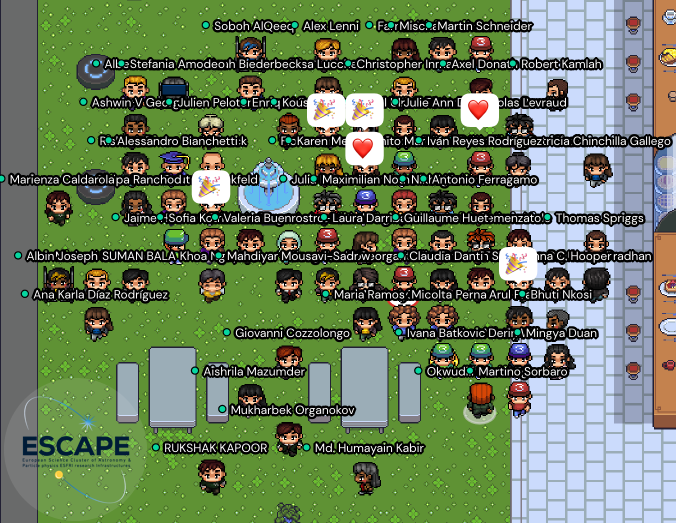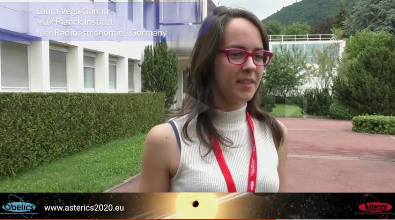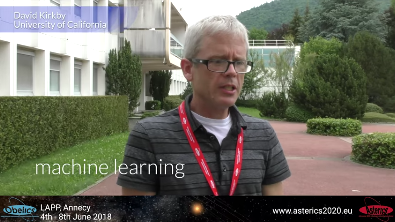ESCAPE SUMMER SCHOOL
Auditorium
LAPP

Happy participants gathering for a virtual group picture
Due to the current situation in France and the rest of the world, the ESCAPE Summer School has been moved to an online event happening from 7 to 18 June 2021.
Registrations opening date: from 26 April to 31 May.
Acceptation to the school is automatic within the limit of available seats. All information regarding the school organisation will be sent to participants after the registration deadline.
The registration is now closed. However, all the school content will be freely available to everybody.
Please, go our lectures portal to find the necessary links:
https://escape2020.github.io/school2021/
School Program: the program of the school is devoted to project development for astrophysics, astroparticle physics & particle physics. The aim of the school is to provide theoretical and hands-on training on Data Science and Python development:
- Coding environment and good code practices
- Version control and collaborative development
- Debugging and profiling
- Python packaging
- Scientific libraries for data science and analysis
- Machine learning
The school is held as a continuation of the Asterics/Obelics summer school.
Course duration: From June 07 to June 18 2021
Organisation: All necessary information will be sent to participants after the registration deadline
Communication: a Slack community for the school is available for communication between participants, to ask questions to tutors, to get out, etc.
School venue: Online event.
Accommodation Arrangements: None (online event)
School Fees: None, it's free!
Requirements: The school is open to all. However, basic knowledge of Python is required to benefit from most of the courses.
Previous editions of the school: 1st, 2nd, 3rd.
Testimonies from students and tutors from second edition:
Who is organizing this school: LAPP is the organizing this school in association with ESCAPE partners, PRACE. This international school is being organized in the framework of ESCAPE.
What is ESCAPE: European Science Cluster of Astronomy & Particle physics ESFRI research infrastructures (ESCAPE) aims to address the Open Science challenges shared by ESFRI facilities (CTA, ELT, EST, FAIR, HL-LHC, KM3Net, SKA) as well as other pan-European research infrastructures (CERN, ESO, JIVE, EGO) in astronomy and particle physics. (https://projectescape.eu)
For more information visit https://www.projectescape.eu/about-us
ESCAPE partners: 31 European organisations with wealth expertise and experience on astronomy, astroparticle and particle physics, three fields contributing heavily to the final designs of the ESFRI projects.
These partners are committed to contribute to the construction of the data research open environment, which is represented by EOSC, and promote the application of FAIR principles for data stewardship. All partners help bringing together and engage a wide range of ESCAPE stakeholders.
More info: https://www.projectescape.eu/partners
About LAPP : Created in 1976, the LAPP is one of the 19 laboratories of the National Institute of Nuclear and Particle Physics (IN2P3). LAPP has about 150 researchers, professor, researchers, engineers, technicians, administrators, students and foreign visitors. The research carried out at the LAPP aims to study the physics of elementary particles and their fundamental interactions, as well as the exploration of the connections between the infinitely small and the infinitely large. LAPP is involved in LHC experiments with CERN (ATLAS, LHCb), neutrinos (STEREO,SuperNemo, Dune), astrophysics (HESS, CTA, AMS,LSST), Future colliders (ILC, CLIC) and gravitational waves (Virgo).
LAPP Website http://lapp.in2p3.fr/
LAPP Presentation video ( in English): https://youtu.be/Sk-xzDEiy7Q
LAPP Presentation video ( in French): https://youtu.be/uPSXV4rAYPw

